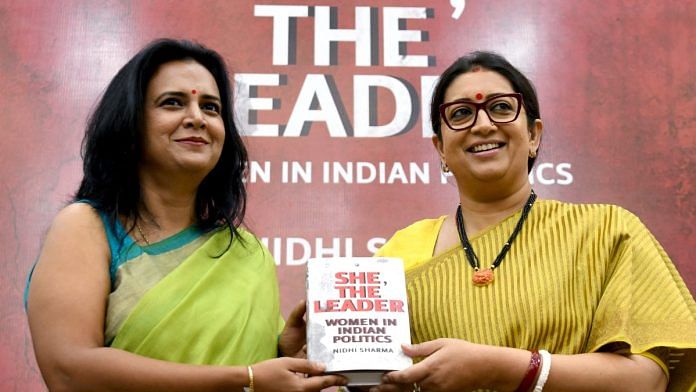Smriti Irani wants to increase female leadership at the grassroots level but she prioritises winnability over gender as the criteria for giving a candidate a ticket. She was speaking at the book launch of journalist Nidhi Sharma’s She, the Leader. Irani is one of the 17 leaders featured in the book.
The discussion at the Constitution Club of India transcended political boundaries. Apart from Irani, BRS’ K Kavitha, CPI(M)’s John Brittas, and Congress’ Manish Tewari got together to discuss women’s participation in politics and the Women’s Reservation Bill.
Published by Aleph, the book is divided into four sections chronicling the lives and political journeys of 17 prominent female politicians including Indira Gandhi, Jayalalithaa, Sushma Swaraj, Mayawati, and Mamata Banerjee. The debut book took shape during the pandemic, the author said.
Also read: India and Sri Lanka have a complicated relationship — trust is a difficult, two-way street
Grassroots participation
Mani Shankar Aiyar from Congress, who was part of the audience, and Smriti Irani shared a common cause — the importance of increased female leadership at the grassroots level. They saw it as a true testament to the growing participation of women in politics, transcending the mere count of MPs at the national level.
However, for Irani, it’s the criterion of winnability that matters most. “I would rather get a ticket because I am a winnable candidate and not because I am a woman,” she said.
Despite much persuasion by Sharma, Irani refused to give a clear answer on the possibility of legislation on the Women’s Reservation Bill being brought in Parliament. But she said the BJP, then in the opposition, had supported it when it was tabled in Rajya Sabha.
“There is a need to create a surge at the mid-level, at legislative assembly level. The focus has been dominantly on Parliament. We need to quantify what political power essentially is. Women have emerged as a significant vote bank, which is making a huge difference,” she said.
Also read: Cricket nostalgia, political nods — Sehwag & Tharoor’s jokes liven up cricket book launch
A desired profession
K Kavitha, a member of the Telangana Legislative Council, said politics wasn’t her initial aspiration. Her decision to stay away was largely influenced by observing her father K Chandrashekar Rao’s efforts to balance political responsibilities with family commitments.
“I had envisioned a path in business, which led me to choose computer science as my field. However, the Telangana movement, a defining moment in our region’s history, ignited widespread participation, and that’s when my political journey began,” Kavitha said.
Irani, who does not come from a political family, said she was often targeted because of it.
“I remember once a very prominent academician said to me — people will call you uneducated. Come to my university and click a photo with me, you would be respected then,” she said.
Rajya Sabha MP from Kerala, John Brittas said that unless India has women members in Parliament and decision-making bodies, change is impossible. “Unless you bring the women’s reservation bill, muscle power and money power will keep and the number of women in Parliament will either remain stagnant or go down.” But then a question was thrown at Brittas by Sharma — why did the CPI(M) only have two women in its Politburo? There was no clear answer.
K Kavitha said that political parties are a reflection of our society, whether it’s CPI(M), BRS, Congress, or BJP. “Without a requirement to include women, progress remains stagnant; no political party willingly embraces change. The factor of winnability will be thrown at our face. Only women with political affiliations will step forward to participate and contest,” she said.
Congress’ Manish Tewari said that in 2004, he had seen men representing women who were elected in meetings, but that times have changed.
“We’ve come a long way since then. It’s a product of evolution, if you have a women’s reservation bill, it will force the pace definitely. My own feeling is the trajectory seems to be in order. Increasingly you have a large number of women coming forward and taking part in public life,” he said.
(Edited by Theres Sudeep)



